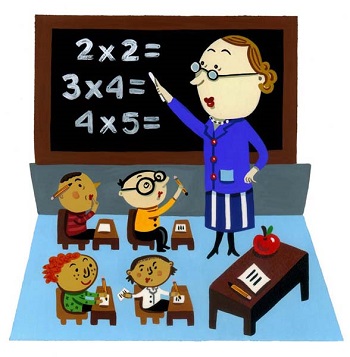- History of Learning Theories
- Learning Theories in Practice
- Behaviorism
- Humanism
- Cognitivism
- Constructivism
Behaviorism
A Case: Teacher A (Alice)

Fig. 1 Teacher A source: http://www.joyinourjourney.com/whats-new-blog/math-tutor-dvds-ti-84-calculatorand-pre-algebra
Alice has been working as an elementary Math teacher for 20 years. She always believes that learning is about passing all the authoritative knowledge to the students and making them memorize everything that is taught. In her class, students need to sit there quietly, listening to what she says, and taking notes about everything that is recorded on the blackboard. She grades her students on the basis of the correctness of the answers. In order to encourage good academic scores, once students get good marks on the exam, she will give them prizes (like a big apple ), otherwise she will punish them by not letting them join the extracurricular.
Behaviorism developed in the first half of the 20th century. Its impact was large, and this school of thought has continued to influence teacher practice in strong ways. With changes in educational goals towards 21st century learning and higher-order thinking, other learning theories need to be considered. First, it is useful to see basic tenets of behaviorism.
Behaviorism
- assumes a learner is essentially passive, responding to environmental stimuli;
- is primarily concerned with observable behavior, as opposed to internal events like thinking.
From the behavioural perspectives, learning
- involves forming associations between stimuli and responses;
- emphasizes a change in external behavior achieved through the repetition of desired actions;
- involves rewarding good habits and discouraging bad habits.
In other words, behaviour is determined by the environment (e.g. conditioning) as the result of stimulusresponse (i.e. all behavior, no matter how complex, can be reduced to a simple stimulus response features).
Behaviorism has been classified into two approaches: Classical Conditioning and Operant Conditioning.
Behaviorism is linked to instructional approaches and strategies such as: